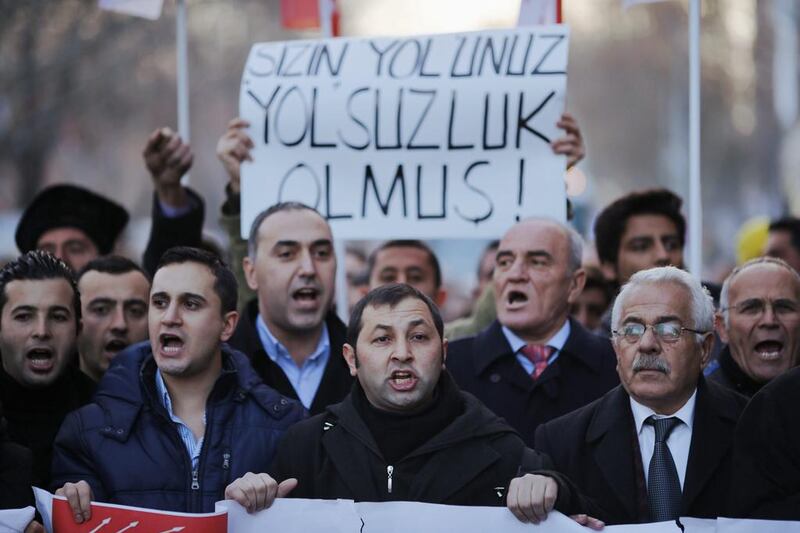ANKARA // European officials yesterday urged Turkey to handle a deepening corruption scandal in a transparent manner, amid concerns that the government was trying to stifle an investigation that has targeted people close to prime minister Recep Tayyip Erdogan.
Mr Erdogan last week reshuffled his cabinet and fired key ministers after 24 people, including the sons of two former ministers, were arrested on bribery charges.
But the Turkish leader has also alleged his government is the victim of a foreign and local plot to destabilise Turkey and has taken steps which opponents say aim to impede the investigation, including the removal of police officers from their posts.
Mr Erdogan also changed police regulations to ensure that corruption probes were funneled through top police and judicial officials close to the government, but a Turkish high court overturned that move.
In a speech in the southern city of Manisa yesterday, Mr Erdogan again alleged a plot against his government and accused the judiciary of being part of it.
“Whoever practices corruption will have us to deal with, but I have to say that there is a very serious smear campaign,” he said.
“There is a gang within the state that is about to become a criminal organisation. They do not know what privacy is. They do surveillance, they bug.
“There are some members of the judiciary who, unfortunately, act in sympathy with certain criminal groups and side with some media outlets in order to smear innocent people by leaking confidential documents.”
An estimated 4,000 people meanwhile, gathered in central Ankara for a protest organised by a civil servants’ union, calling on the government to step down over the scandal and chanting: “May the thieves’ hands be broken!”
On Friday, riot police used water cannon, tear gas and plastic bullets to push back hundreds of protesters trying to reach Istanbul’s main square, Taksim, while some protesters threw rocks and firecrackers at police. Police also broke up a similar demonstration in Ankara.
The scenes were reminiscent of the summer’s mass anti-government demonstrations – which were sparked by a government crackdown on an environmental sit-in opposed to redevelopment plans for Taksim – but the numbers taking part in the anti-corruption protests have not reached the same level.
The European Union’s enlargement commissioner, Stefan Fuele, expressed concern over the scandal and said it should be tackled in a “transparent and impartial manner”.
He also welcomed the Turkish high court’s decision blocking the new police regulations, saying the government’s move had “undermined the independence of the judiciary and its capacity to act”.
“I urge Turkey ... to take all the necessary measures to ensure that allegations of wrongdoing are addressed without discrimination or preference in a transparent and impartial manner,” Mr Fuele said.
The Swedish foreign minister Carl Bildt urged Turkey on Twitter to return to “EU-inspired and democratic reforms” while Frank-Walter Steinmeier, the German foreign minister, was quoted as telling the Bild am Sonntag newspaper that nations must clear up corruption allegations without regard to who is involved.
“In the Middle East, which is marked by crises and conflicts, a Turkey that is steady internally and externally is needed as a stable anchor,” Mr Steinmeier said.
Turkey has been seeking to join the European Union for 26 years but membership talks, which resumed in November, have stalled in the past over issues such as freedom of speech, democracy, treatment of minorities, judicial reform and tensions over Cyprus.
* Associated Press with additional reporting by Agence France-Press





